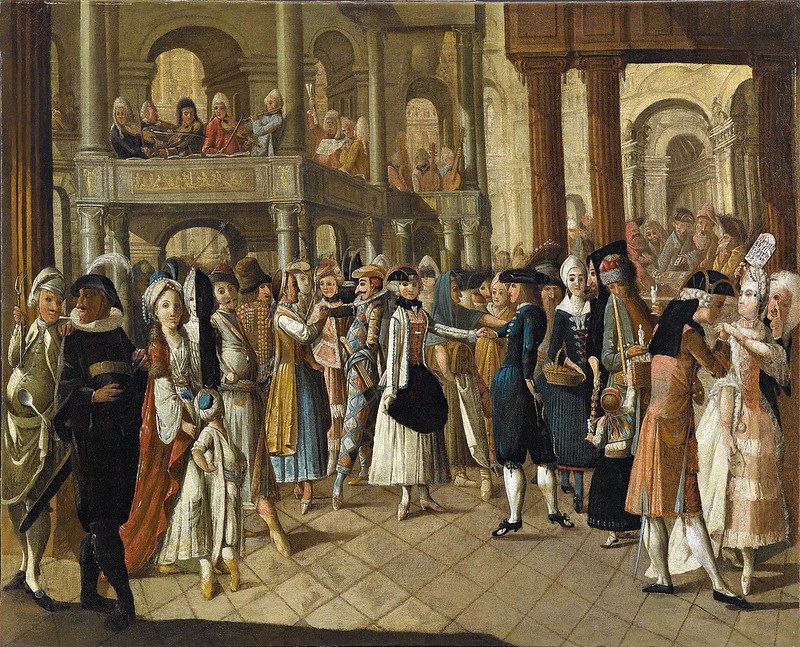Fortunato Chelleri (1690-1757) - Sinfonia (B-Dur) à 4 (c.1745)
Performers: La Stagione
Further info: Fortunato Chelleri (1690-1757) - Simphonies Nouvelles
---
Italian composer of German origin. He was a choirboy at the chapel of
the Madonna della Steccata, Parma (1700-03), but after the death of his
German father when Fortunato was 12, and of his mother three years
later, he was cared for by his maternal uncle Francesco Maria Bazzani, a
priest and maestro di cappella of Piacenza cathedral, who instructed
him in singing and keyboard playing. It seems that Chelleri's first
opera was Zenobia in Palmira, composed in 1709 for Barcelona, which
during the war of the Spanish Succession regained its status as a court
and mounted an opera season with a group of Italians headed by Caldara,
Astorga and Porsile. Chelleri's movements after his return from Spain in
1710 remain undocumented up to 1715, when, at the latest, he was
employed as maestro della cappella di camera by the Elector Palatine
Johann Wilhelm and, following his death in 1716, by his brother Karl III
Philipp. It is uncertain whether Chelleri attended the electoral court
in its various residences in Germany; his frequent engagements in Italy
suggest otherwise. After 1718, he may have served the dowager electress
Anna Maria Luisa de' Medici in Florence, where she retired after her
husband's death. Possibly two of his operas, later given in Padua and
Venice, had their première in Florence: Temistocle and L'innocenza
diffesa. His main operatic activity spanned the years 1715-22 and took
him to several northern Italian centres. In Venice, Vivaldi, responsible
for the Teatro S Angelo in 1716-17, entrusted him with the second opera
for the season, Penelope la casta, but the unsuccessful outcome
provoked an assassination attempt against Chelleri and a 48-verse satire
on the ill-fated production. Otherwise his career in Venice was
moderately successful; he composed seven operas in eight years, and
while he did not receive scritture from the major theatres, he was by
far the youngest composer working in the city.
In 1722 Chelleri joined a group of Veneto-based musicians (among them
Giovanni Benedetto Platti) who entered the service of Johann Philipp
Franz von Schönborn, Prince-Archbishop of Würzburg. He was engaged as
Hofkapellmeister and promoted to Court Councillor (Hofrat) in 1723, the
year of his marriage to Apollonia Theresia Papius, with whom he had
three sons. He wrote mainly oratorios, as required by the bishop and his
brother, Count Rudolf Franz Erwein, who often translated Chelleri's
oratorio texts into German and employed him in his private orchestra at
Schloss Wiesentheid. However, the new post was short-lived as in 1725,
soon after Johann Philipp's death, Chelleri became Kapellmeister to the
Landgrave Karl of Hesse-Kassel in succession to Ruggiero Fedeli and
moved to Kassel, where he spent most of his later life. In October 1726,
following an exploratory trip in summer 1725 to Hanover, where George I
of England was residing, Chelleri travelled to London, where many of
his Italian colleagues were employed, notably Pietro Sandoni and his
wife (reportedly Chelleri's former pupil), Francesca Cuzzoni. His hopes
for a commission from the Royal Academy of Music never materialized, but
during his ten-month stay he briefly became a subscribing member of the
Academy of Ancient Music (November 1726) and published a collection of
arias and cantatas before returning home to Kassel. When Landgrave Karl
died in 1730, his eldest son and successor, Friedrich, King of Sweden
since 1720, dissolved the cappella and Chelleri was given an allowance
until he found a new post elsewhere. In 1732 he joined Friedrich's court
in Stockholm for two years but, unable to bear the northern climate, he
returned to Kassel in 1734 with the title of Hofrat to direct music for
Friedrich's brother Wilhelm, administrator of the landgravate.

Cap comentari:
Publica un comentari a l'entrada